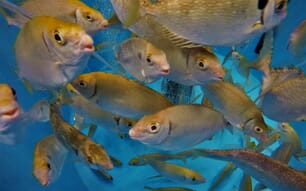King Salmon aquaculture general manager Mark Preece said on some days last week, seven per cent of fish died at its Pelorus Sound marine farm. Testing by the Ministry of Agriculture and Forestry confirmed the fish were clear of all known viruses and bacterial diseases, reports MalboroughExpress.
Mr Preece said the number of fish with small lesions like swollen mosquito bites had increased in this summer-autumn period. It was not known how many deaths on the 500,000-fish farm were caused by these lesions, old age, stress and seal attacks. The delicate king salmon species was hard to farm and normally had a five per cent death rate over summer, Mr Preece said.
King Salmon had introduced measures to make sure no biological material was transferred to or from the site and no equipment on the farm would be moved, he said.
Those steps would stay in place until further test results came back confirming the exact cause of the problem and remedies.
Fish from the affected farm would not be harvested until November, "so we have time on our side", Mr Preece said.
All affected fish had been destroyed and disposed of. None had been sold and none would be in the future.
"The issue affects only the one farm and fish in our other farms are free of any problems," he said.
King Salmon towed the affected marine farm between Forsyth Bay and Waihinau Bay every second year to fallow the seabed.
Since the farm had been at Waihinau Bay for only three months, management was unlikely to have caused the health problems, Mr Preece said.
Marlborough District Council operations and maintenance engineer Steve Rooney said King Salmon dumped its dead fish at the Blenheim landfill, where they were buried.
Volumes were always higher at this time of the year when the sea was warmer than usual.
Ross Broadbridge, of Marlborough Waste 2002 Ltd, said each week between about January and March, his company carted about three 3.6 cubic metre loads of dead salmon to the landfill in a closed container. Overall, fish deaths seemed lower than usual this year, probably because of cooler sea temperatures, he said.
Salmon Deaths a Mystery on Marine Farm
NEW ZEALAND - New Zealand King Salmon wants to know why an unusually high number of fish died at one of its Marlborough Sounds marine farms last week.
by Lucy Towers




